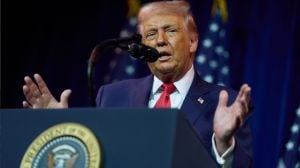WTO to delay Indo-US row report
NEW DELHI, Oct 17: The World Trade Organisation's WTO report on the Indo-US row over Indian import restrictions is being delayed due to...

NEW DELHI, Oct 17: The World Trade Organisation8217;s WTO report on the Indo-US row over Indian import restrictions is being delayed due to further queries to the International Monetary Fund by the WTO dispute settlement panel.
The report will now be circulated in the second week of December instead of this month as originally scheduled. The delay is said to be caused by the panel seeking further clarifications from the International Monetary Fund as the dispute refers to India continuing to use a balance-of-payments BoP clause Article XVIII-B to restrict its imports.
The provision allows countries with BoP problems to restrict their imports impose quantitative restrictions or QRs. India still uses this to restrict imports but its trading partners say its BoP is no longer under threat.
India is one of less than half a dozen countries which still use the BoP cover against imports. The IMF has said in the past that removing all QRs within a couple of years would not endanger India8217;s BoP. Sources closeto the dispute said the government was using the time while the dispute lasted to protect its interests if it lost the case, which they said was likely.
They said India8217;s moves to legislate a safeguards law which could restrict over-large imports of particular products, and its rising use of anti-dumping measures against imports, were in the anticipation that it may be required to quickly phase out its QRs after the WTO8217;s final ruling.
India is already phasing out large numbers of QRs subsequent to bilateral deals with other partners. It had similar disagreements with the European Union, Australia, Japan and New Zealand among others but these were resolved except the one with America. Sources maintain that India8217;s reason for letting the dispute be settled in the WTO was to buy time. Unlike the other deals struck to mutual satisfaction, India8217;s dispute with the US was more tangled.
America wanted quicker removal of QRs on items such as cars and textiles than India was willing to allow. It was alsodemanding that India should bind put a ceiling on the tariffs it would apply on these imports when they were no longer physically restricted.
India realises that it will have to remove QRs sooner rather than later. But the WTO process gives it time. It is already over a year since the complaint against India was made to the WTO last autumn. If the final ruling early next year goes against India it can appeal against it. If that went against India it would still have around a year to implement the ruling.
Implication of WTO verdict
MUMBAI: The implication of the WTO ruling against the US ban on shrimp imports from India and Pakistan, Malaysia and Thailand is that national laws must be consistent with WTO rules. The consistency requirement stems from prescriptions relating to quantitative restrictions. So, the gain in access to the US market for India8217;s shrimp exports correspondingly means that pressure will build up on India to dismantle quantitative restrictions on imports covering roughly2,400 tariff items. These restrictions have been imposed on balance of payments considerations. India wants time to phase these out starting 1997 in seven years ending 2004. But the US has filed a dispute in this regard with the WTO to press for a big-bang withdrawal of restrictions. While India is all for opening up imports, it is genuinely worried that exports fall short of imports.
- 01
- 02
- 03
- 04
- 05































